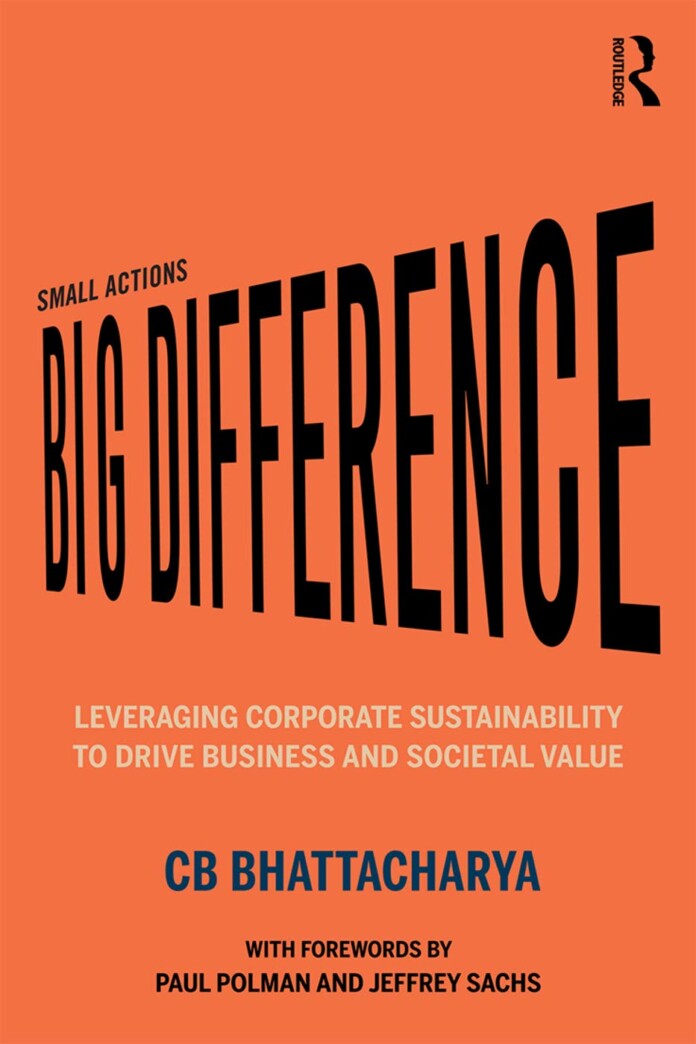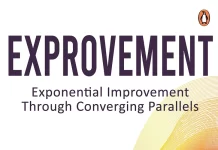Often, the converted too need handholding so that they can practice what they are passionate about or convinced about better. They need someone to break seemingly difficult processes down to manageable levels. They definitely need a guide during their transition phase from knowledge to action on the ground.
That’s exactly what Prof. C B Bhattacharya has done with his book Small Actions Big Difference – Leveraging Corporate Sustainability to Drive Business and Societal Value. It was published by Routledge in 2019. The book’s distribution suffered due to the pandemic. He has co-authored Leveraging Corporate Responsibility: The Stakeholder Route to Maximizing Business and Social Value and co-edited Global Challenges in Responsible Business.
With endorsement from Paul Polman, former CEO of Unilever and Jeffrey Sachs, famous Professor at Columbia University and author of The End of Poverty – How We Can Make it Happen Within Our Lifetime, CB, as he is popularly known, needs less effort to hard sell the promise of the book. The title of the book makes it clear that it is a call-to-action book. Leaders today can see what the result of inaction can be.
The book is based on interviews with 25 global multinational corporations as well as employees, middle managers, and senior leaders across multiple sectors. CB claims that this is the first book that connects sustainability to the theory and principles of psychological ownership and proposes a succinct, easy-to-digest model for managerial use.
Incisive in both breadth and depth, CB’s model for action, even if they are small, needneeds the leadership team to have an immersive approach first to visualize the contours of their impending action. Without that, a process-driven top-downprocess driven top down approach to sustainability will receive minimal results. Today, a sustainable organization – large, medium or small – needs to have a 360-degree360 degree approach.
‘How to make sustainable change stick’ is a big challenge. It is easy to roll out excellent plans but staying at it and improvising it needs stamina and commitment to long-term goals. This too needs tools that can seamlessly drive action. Otherwise, the drain on leadership’s energy could be counterproductive.
Co-create for Society
There are several books today on sustainability that are more about why organizations need to adopt and the cost of not doing so soon. However, there are very few that show ‘how to’. Jeffrey Sachs in his foreword says this book is “a clearly written guidebook to sustainability leaders.”
Conceptually leaders believe and want employees with a sense of ownership. But that does not come ready-made. How to first build and nurture a sense of ownership itself needs a manual and this book attempts to provide that. After creating a sense of ownership, how it is harnessed is a challenge in itself.
Whether the guidebook is working well is too early to say. But saying this book is only a guidebook would be doing a disservice to the larger outcomes he expects to drive. CB expects business leaders to think beyond their companies and ask what they can do to reverse global warming and prevent a potential runaway climate crisis. It can begin with proactively engaging with all stakeholders and getting them to ‘own’ the problem and the solutions.
The author takes the co-creation model late Professor C K Prahalad propagated and applies it to building a culture where leaders and employees actively participate in working towards goals that are beyond themselves. As Paul Polman says, “Business must redouble its efforts in support of driving sustainable and equitable growth (of societies) through new thinking.”
Clearly, there’s a lot that needs to be done. Changing a current corporate sustainable movement that is, in CB’s words, ‘unsustainable’ and moving away from those pursuing the right goals the wrong way, will be daunting. Small Actions Big Difference may be a go-to manual for those with the right intent.
Watch the author talking about the themes in the book at the TedX:
https://www.youtube.com/watch?v=7XpmsD2b76U










